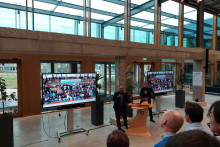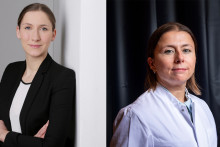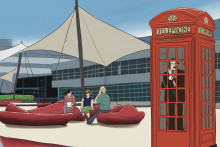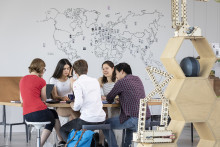On the official topic, the State Budget, not a whole lot was said in the House of Representatives on Tuesday evening. Nor was it really a debate, because many new MPs held their ‘maiden speeches’. Tradition dictates that on this occasion, they are not interrupted by tricky questions of fellow members.
Although a few more specific topics – should the basic student grant be increased? – were discussed, most of it was broad terms, veiled hints and snippets of nuance. Thursday, when Minister Dijkgraaf will respond, things will probably be different.
Caricatures
Most notably, NSC and VVD somewhat nuanced their previous views. Former columnist and microbiologist Rosanne Hertzberger did the talking on behalf of NSC. She said: ‘Of course we don’t want all international students to leave or make the fundamentalist choice of having all programmes be Dutch-taught. Those kinds of caricatures are utter nonsense.’
She did repeat that her party thinks the large intake of international students and the anglicisation of higher education is a problem. In principle, Bachelor’s programmes should be Dutch-taught, but exceptions could be made for certain professions or regions.
VVD also adopted a less hard line than during the election period. The party originally wanted to make all Bachelor’s programmes Dutch-taught, with an exception for universities of technology. MP Claire Martens-America didn’t say anything on this subject this time. In reference to the intake of international students she did mention the shortage of student housing and ‘the high costs for Dutch society’, but Dutch-taught Bachelor’s programmes didn’t come up.
Her solution: the Minister must make haste in coming up with enrolment restriction options that will allow institutions to curb their intake. Later on in the debate, she told Jan Paternotte of D66 that VVD wouldn’t be in favour of deciding ‘top down’ which programmes have to apply these enrolment restrictions. ‘I think education institutions themselves are more than capable of doing so.’ She gave the example of the Brainport region around Eindhoven. ‘I fully agree with Mr Paternotte that if we say that everything should be done in Dutch there, we will have major shortages in the labour market.’
Blunder of historic proportions
Paternotte argued passionately in favour of internationalisation. ‘There are shortages, so we need more guidance, but let’s not make a blunder of historic proportions by having almost all Bachelor’s programmes taught in Dutch. There’s a lot at stake if we don’t make the right choices now.’ He pointed out that Denmark faced shortages in the labour market ‘after they closed the door to international students in 2018’.
Luc Stultiens (GroenLinks-PvdA) also drew attention to the positive side of internationalisation. He took noticeable pleasure in quoting an old column by Rosanne Hertzberger, in which she wrote: ‘There’s nothing more enriching than meeting the rest of the world in the lecture hall. This teaches you how small you are, how limited your perspective is.’
Antisemitism
Of course, there were more topics of discussion. SGP, ChristenUnie, BBB and PVV drew attention to antisemitism. ‘Meanwhile, Jewish students are no longer feeling safe at our universities and we are failing to crack down hard on hatemongers’, MP for PVV Patrick van der Hoeff stated, for example.
The basic student grant was also brought up. It has been increased for students living away from home this year. D66 and SP suggest extending this increase by at least one year. ‘I expect broad support’, said Paternotte, ‘because a large majority of this House has spoken out for an increase of the basic student grant ever since it was introduced.’
Science
Relatively little was said about science policy, although Stultiens did ask his colleagues to take science seriously. ‘Earth is not flat, climate change is not an opinion; and long COVID isn’t just in your head, I know from people around me.’
Hertzberger briefly talked about the fate of Nobel Prize winner Katalin Karikó, who never received funding for her research and won the Nobel Prize in spite of American science policy. How would she have fared in the Netherlands, the MP for NSC wondered. ‘Are we able to offer these people time and space to tinker, to follow their curiosity, to fall and get up again? The answer is: probably not.’
And Christine Teunissen (Partij voor de Dieren) criticised the influence business has on science and education. ‘There are still close ties between fossil industry, science and education’, she said. ‘Shell, for instance, co-funds eight university chairs. Tata Steel funds a chair. In Wageningen, endowed professors are sponsored by dairy companies to research how cows can produce even more milk, turning a blind eye to anything but commercial advantages.’
Follow-up
Thursday, outgoing Minister Robbert Dijkgraaf will respond to the questions and remarks by the House of Representatives. After that, the MPs will submit their own proposals.
The budgetary year itself has already started and the cabinet is outgoing. Talks are being held about the formation of a new cabinet. Major changes are not expected, therefore. That is, not if they cost money.







